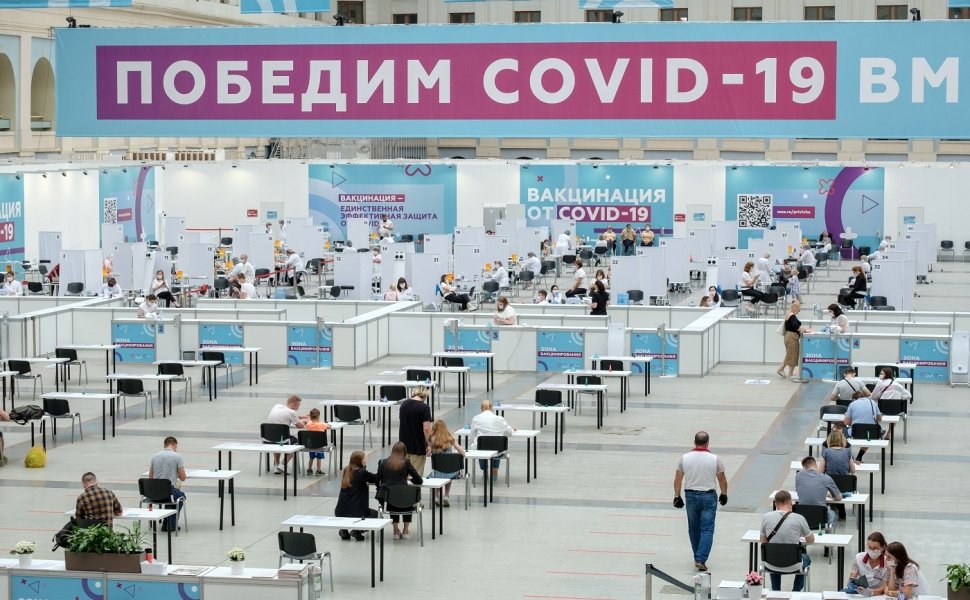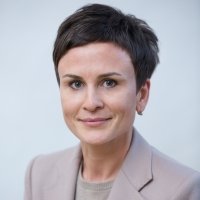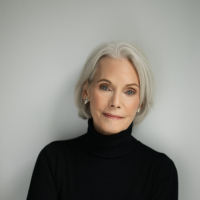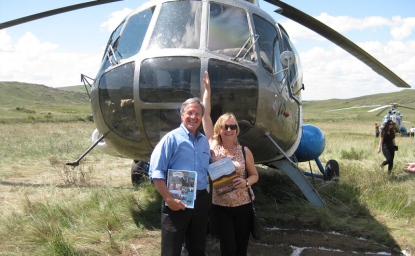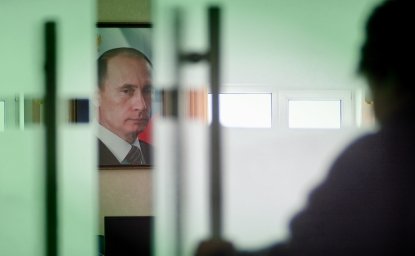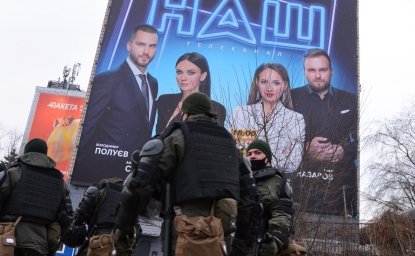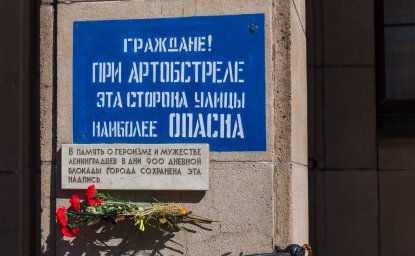The transcript has been lightly edited for clarity.
Jill Dougherty: From the Kennan Institute in Washington D.C., welcome to KennanX, a podcast on our never-ending quest to understand Russia, Ukraine and the surrounding region. I'm your host, Jill Dougherty.
***
Jill Dougherty: Today, we're going talk about health and Russia. As I walk down the streets of Washington DC, I see more and more people wearing masks. So Covid is back, although for the most part it's a milder version. And thanks to vaccines, far fewer people are getting seriously sick or dying from the disease than when it was at its peak three or so years ago.
So all of that was on my mind when I read the July Kennan Cable number 93, Health and Security in Russia, “Putin's First Special Operation.” Of course, I was intrigued. I remember very well how Russia beat the world to the punch by rolling out its Sputnik V vaccine before another nation did it. Of course, it wasn't as rigorously tested as Western vaccines, but it did spark a lively and sometimes contentious debate about vaccine diplomacy.
And that led me to thoughts about national security and public health. And finally, that led me to Nataliya Shok. She was the author of that Kennan Cable, and I'm very happy to say that she's my guest today on Kennan X. Nataliya Shok is Adjunct Associate professor at Georgetown University School of Medicine and a public policy fellow at the Kennan Institute, both here in Washington DC. Welcome, Nataliya, and sorry for that long introduction.
Nataliya Shok: Hello, Jill. Thank you for having me on Kennan X.
Jill Dougherty: Great. Well, I think this is going to be a very interesting discussion. You know, part of this I kind of knew, and then when we started talking I thought, Ooh, there are aspects of this that I did not know. So you have a unique view of the issue. You have experience here in the US, as we just said, and then you have that career in Russia. You were actually principal investigator at the Russia Science Foundation in Moscow. And then also, in Nizhny Novgorod, you led research development and administration for an interdisciplinary scientific project on bioethics and the history of medicine.
So, in the Kennan cable, you begin with a quote from Vladimir Putin in his February interview with—of all people—Tucker Carlson. You said “Putin”, and this is a quote, “raised concerns about the existential threat, scientific and technological advances in genetics posed to humanity,” and he actually went on to compare that to nuclear weapons.
So, that's what we're going to talk about today: public health, state security. And one, I think important aspect you also said: that trying to understand Russia's approach to health policy could help the West to decide how it should engage or maybe not engage with Russia on issues like health and science. Could we begin—at the end of the Soviet Union, we all remember, the nation’s economy was a disaster, the healthcare system had fallen apart. So the authorities, you say, saw an urgent need for a different approach because they no longer had that centralized control of the Soviet system. So could we start there?
Nataliya Shok: Yeah, sure. Definitely. I love bringing history into the modern conversation specifically when it comes to health and security. To me health is a very unique tool research tool you can use and utilize. So it can create a very different perspective on what is going on now, and it can help to bring different parts of our common international history into the modern conversation to be sure that you understand better the behavior of countries like Russia. And I agree with you, it's very important to start early, in the nineties. And as you pointed, and I tried to make it clear in my Kennan cable, of course Russia was concerned about national security, but there were different groups of people.
First of all, there were groups of epidemiologists and public health people. They were really concerned with the growing tension that started to happen in demographics in Russia and in public health because, after the USSR collapsed, borders were different. It means that Russia didn't have the same borders as it used to have as a Soviet Union. So it used, it used to have a wider, broader territory, and now Russia had to control the perimeter that used to be without any control: with Kazakhstan, Ukraine, Belarus, different countries that have become independent. Also, the tourism started to grow. It was a closed country, and so people started going for pilgrimage. For example, that was the case how the cholera epidemic in Dagestan started. The evidence from that period of time. It's a very tiny book titled Cholera and Dagestan written by the Chief Epidemiologist for a long period of time. He's well known here in United States, Gennady Onishchenko, a very famous figure. And he was in charge for this epidemic response back then. So after this experience, he insisted that we have to recreate, reconsider the formerly existing pandemic control system. And so the whole period in the nineties was about re-figuring out how to create an effective epidemiological control in a new, free Russia.
Well, also, there was a second group of people, mostly military and defense and security people who were concerned about different things like bio weapons and biosecurity, and they were constantly talking about the need to reinvent the national security strategy that was not anymore existing in the bipolar world. So the number of threats started to grow. And of course, they wanted to bring more diverse portfolio to a new, national security and in New Russia. So these two groups, I do not wanna say they were connected, but by the end of nineties they started to work more closely together because there was an urgent need in a new national security strategy where health and biosecurity started to take a place.
Jill Dougherty: Yeah, and that is where you kind of get into this point about initially they were emphasizing the democratic nature of all the new requirements, et cetera. And then they began to shift back to the old Soviet, era epidemiological surveillance attitudes and practices, and I actually underlined what you said, as during the Czarist and Soviet eras, “the state was to take precedence over the individual,” so tell me about that.
Nataliya Shok: Yeah, that's interesting. I love history of medicine. It's not super popular in the United States as a field of study, but it's extremely popular in Europe and it used to be quite popular in Russia. Unfortunately, the history of medicine is when physicians (mostly) write about physicians for physicians. And so it's kind of a boring thing to read and go through. So it's very difficult. They use their very specific language. So I'm very used to it, but not like an average person can read it. So my focus was on the social dimension of the history of medicine. The social dimension means, how medicine was connected to other state directions of policy and how physicians operated. And what was interesting about the Soviet experience in epidemiological surveillance: even though epidemiology and sanitary medicine and epidemiological surveillance was a part of Ministry of Health, which was civil in nature, so public health something. They, since early seventies, obtained an independent funding and they constantly worked more closely with military physicians, including epidemiologists, and also they had a very independent funding, and they were independent in terms of how to create the quarantines and the type of protection for the population, their own policies. So, they were subordinated to Ministry of Health on one hand. Legally, officially, publicly. But in practice, they were extremely powerful in managing situation when it comes to the risk of pandemic or any sort of infectious disease outbreak, and so we saw it very clearly.
This exercise was so colorful when COVID-19 hit Russia. Maybe you didn't notice this because it was almost impossible to understand what is really going on inside Russia. But I spent the whole pandemic there before I came here as a George Kennan Fellow in 2022. So I was able to witness everything that was going on. Just in one day, the main and the most important person in Russia was the chief sanitary physician, the main epidemiologist of country, Anna Papova. The started ruling everything and everything, every, every ministry, the borders, the rules for if you wanted, to cross the regional borders within the country. Not like the borders with other countries, of course, they were blocked and closed, but even the borders between regions in Russia. The rules were determined by the chief sanitary physician. Not military, not Ministry of Interior Affairs, not police, not governors, not Putin, nobody. Just Chief sanitary physician. She was the head of the pandemic response on one hand, but basically all state agencies were subordinated to her orders and decrees. That was enormous.
Jill Dougherty: Could I jump in? Because I actually thought that what you were going to say was “and she was subordinated to the security agencies” because, you know, you have that amazing phrase in your paper saying the reform was described in the press at the time as a special operation, a blitz reform, a key step in the construction of President Putin's famous vertical of power. So wasn't she part of that system? Wasn't she subordinated to the security people?
Nataliya Shok: Yes and no. It was interesting, you know what happened? So there was a different decree that was published just when pandemic started. So every security agency in Russia, they have their own medical system, sort of like a medical facility and their own epidemiologists. And, all those epidemiological teams in those security agencies were subordinated independently to Anna Papova, to Chief Sanitary Physician.
But when the reform of state management system, where public health has become a part of it, started in 2004. That was the case when the new agency, which was named very weirdly, роспотреднадзор, they started to be subordinated to security agencies, because they were inventing their place among them. And the head of this agency was, again, Gennady Onishchenko, whose career started in Soviet Union of course, and he was the chief of the the department of rare infection and extremely dangerous infection diseases in the Soviet Union Ministry of Health. So he has already known, by the time he was appointed as the chief of a new agency, how to work together with security agencies and military agencies and what, should epidemiological surveillance look like if you want, to subordinate public health to security needs.
Jill Dougherty: You know, it's back to the USSR.
Nataliya Shok: Absolutely. Absolutely. They even hired the same person.
Jill Dougherty: Let's talk about the Sputnik V vaccine, because I think a lot of our listeners would probably know a lot about that. So the country rolls it out. They're the first people in the world who have this vaccine. The point that I found very interesting, you were saying that really it is a mechanism for showcasing Russia's approach to competition between great powers during a health crisis.
Jill Dougherty: It's kind of like PR, in a way for Russia, the way Sputnik, the satellite, played back in the 1950s and it actually scored some points in the global south. So run us through a little bit of how the government looked at Sputnik V and what they were trying to accomplish, not only save lives, but with their foreign policy.
Nataliya Shok: Oh, Jill, thank you for a great question, because when I just started my fellowship here in the Wilson Center, I started a little bit later than I expected to start, because it took me almost one year and a half to get here because of lockdowns and different restrictions regarding vaccines. Mm-hmm. And I started experiencing difficulty with vaccination when I was back in Russia because I got my Sputnik V there. But unfortunately, when I realized that I have to travel, it was not accepted here in the United States. So, so I had to figure out where I can get a different vaccine to be able to come here to Washington, DC and start my fellowship.
So I traveled to my native city Kharkiv and I got a different shot, which is Chinese vaccine. Oh. And so I was able to come here because Chinese vaccines, they were WHO-approved. And so even back then, I realized how interesting vaccines are interwoven with the human lives, not in terms of saving their lives, but determining the way how this particular person can manage their lives. Specifically traveling and of course getting any sort of promotional career developments, like I expected myself to be, in Washington DC and making my research here. So going back to the Russian approach, it was very nuanced and it evolved. So when they just announced, do you remember, it was August, 2020,
Putin himself announced, we are the first who created the Covid-19 vaccine. He was so excited, and so immediately everything started to move faster around him. And the Russian state, actually, didn't have enough practice in vaccine manufacturing and distribution for the crisis of the scale and magnitude that COVID-19 pandemic was. And so when he announced and said, we are able to save the whole world, basically, maybe a little bit later Russian government realized that they do not have enough capacity to even produce, these vaccines for themselves, and also to ship them abroad. This strategy evolved and very interestingly, it was not like Russia had the vaccine diplomacy strategy from scratch.
So interestingly, I think it happened in late 2020, early 2021, when they realized there is no way to get a WHO approval, because first they violated certain regulations when they just started the first stage of clinical trial and vaccine on Sputnik vaccine. Then when they accidentally suddenly stopped the third stage of clinical trial of Sputnik V vaccine—so basically saying, we already started the national vaccination campaign, we do not need to continue this—so of course, the international community had become alerted about that. And so, the Russian State, when they started approaching WHO, they realized that they will potentially never get the approval.
So, what they made of it, they started to approaching countries bilaterally. So here when I just started my fellowship at the beginning, they mentioned, in the beginning I saw a lot of publications saying that Russian vaccine diplomacy was actually a failure, because they violated regulations, because they didn't get WHO approval.
But I started questioning this common vision on this situation with COVID-19 vaccine produced in Russia, because on Russian side it was not a failure. They were not able to create as many vaccine as were needed, and that would enable them to join Covax, for example, and distribute it through this international partnerships.
They were only able to produce some vaccines for themselves and probably for neighboring countries like Kazakhstan or Belarus or whatever. They started to explore the different routes. By that I mean, that they started approaching countries bilaterally, offering them not a shipments of ready product—they offer them a technological transfer, which means they basically said, we will share our technology with you, but please use your own facilities. We will send you some professionals. We will send you some technological advisors. But please do produce it yourself.
Jill Dougherty: Ah, I see. I didn't realize that. Okay.
Nataliya Shok: So unfortunately we cannot just say how many real projects are cured after that. Officially, the website says that they sent—this way or another, they send their vaccine to more than 70 countries.
Maybe this is true, but the most important part of it was the political gain. It was not about global health, public good. It was more about the political gain that Russia took of it. Mainly I would like to say that, while Western countries were so selfish and we all know about vaccine nationalism and those tendencies, Russia tried to showcase a very different approach, very friendly. Offering anybody, anything that was related to vaccines. So basically they were not so protective towards the patents or whatever, they were not interested in that, as well as they were not interested in pursuing WHO approval, because they realized that it's much easier to make a deal with a particular country and get an access into their market and getting access to the global health powers club, maybe. Let me put it that way. And so they realized that there is no need to follow the international rules, and I think this is the scariest part of this lesson. And this is something that is very hidden from a conventional vision of what is global health about.
So we have a shared risk and we have to respond to this risk together making agreements. But, Russia realized that there is no way for her to fit those regulations. And Russia started to create an alternative for itself and for those who were willing to join this alternative path of, you know, COVID-19 response in their own countries.
Jill Dougherty: It sounds like their general foreign policy.
Nataliya Shok: Yeah, absolutely. So the point is that when you use health, you can see the very unusual side of a foreign policy and sometimes you can see and predict, what can happen in different parts of the foreign policy Let's say climate, it's another shared global health problem. So, and we do not know much about what Russia is doing in this area as well. The same AI, the same digital technology. So we know so little about Russian approaches, but I can say that they are very informative in terms of how nuanced and very security driven Russian policy, both domestic and foreign is.
Jill Dougherty: Hmm. I want to ask probably the final question about understanding what Russia is actually doing and how it views public health. But I have one quick question before that. Has the full scale invasion of Ukraine actually affected Russia's public health policy?
Nataliya Shok: Yeah, it's a great question, because when the invasion started, I was already here being on the fellowship and of course I do have a lot of colleagues there who are physicians, and I started asking them, and at the beginning of the invasion, they were all terrified, because they were scared about the lack of medical supplies. Because of different terms of sanctions, policies, even though health for them were not covered by sanctions. So pharmaceuticals and different types of medical equipment. They are not sanctioned. But the logistics now is different, and the difference started to grow back with the invasion started. So, and of course we can see in the rhetoric and political rhetoric that the public health is focusing on first, demographics. We need more children to get in Russia, so we need more people, because of the demographic crisis. And the second point is—I don't want to say it's just started with the invasion.
It started in 2021 when Russia revised national security strategy. Basically, they replaced terms related to regular public health things like cardiovascular diseases, respiratory diseases, tuberculosis, with terms like biothreats, biosecurity risks and whatsoever. So basically what happened in 2021, amidst COVID-19, they only enlargened when the invasion started. So the whole conversation right now is more about like biosecurity threats and prevention of the new infectious diseases. So it's less about, unfortunately, non-communicable diseases. And I must say that physicians right now, I think they feel that the landscape has changed.
Jill Dougherty: And in your article you do mention a central command unit and special forces, and that obviously intrigues me. You say the Russian Global Pandemic Center will coordinate biological laboratories in strategically important regions, namely Africa, Southeast Asia and South America. What is going on here? Are they creating or coordinating laboratories in those areas?
Nataliya Shok: Yeah. That's interesting and thank you, Jill for this question, because we know that foreign policy often is an extension of domestic policy. And this example is exactly about this. So in 2021, Russian President Vladimir Putin announced that he doesn't want to see the next pandemic with lockdowns, he wants to see the next pandemic response without any lockdown. And so he announced the Sanitary Shield program, basically aimed to protect the Russian territory from any new viruses or infection diseases, based on checkpoints, laboratories. In 2021, he announced it as a domestic policy tool, but in 2023 when I started exploring the foreign policy changes that Russia made in March 2023, I was interested in the way how they redefined the whole initiative President Putin announced in 2021.
They created a more global scope for this initiative. They started developing relationships drawing on COVID-19 lessons. So the same way they approached vaccine diplomacy the same way they started using security, sanitary shield project. They started approaching countries bilaterally, offering them, let's say mobile bio laboratories, for example countries like Burundi, like Uganda, like Venezuela or Nicaragua.
So those countries received different help with medical equipment from Russia and Russia started using this the same way they used these channels during COVID-19. And interestingly, they started to announce a new re, redesigned, revisited, revised Sanitary Shield program domestically. So basically in two years, this program, which was started as a domestic program, evolved into the global initiative aimed to create a Russian networks of bio laboratories, teams on the places, and including special agreements with countries who are willing to be a part of this network. Sort of like joining the Russian vision of pandemic preparedness. Because Russia, right now, it's not a part of any global health security or any global health initiative except of WHO-led conversation on pandemic accord and UN-led bio weapon convention regulations.
These are two initiatives where Russia is a part of, but others like CEPI or US-led Global Health Security initiative. Russia is not a part of it. So Russia is creating, again, alternatives.
Jill Dougherty: This is really helpful in—I guess the summation of what you were saying in that article, which is to help the West and the United States understand how Russia views public health. And these are aspects that I have to admit I did not know about, and they're very interesting because it really, I guess you'd have to say public health now is subordinated to strategic military and diplomatic objectives, that it's, it's really a major part of their foreign policy. Is that correct?
Nataliya Shok: Yeah, it's correct Jill. The point I was trying to make was not about saying, oh, hey, here is another way of how Russia practices its securitized actions in a new domain, like health. It was more about trying to bring very different, unusual part of Russian policy into the conversation about Russia. Because the more nuanced information is about Russia, the more detailed understanding of what Russia is doing, not only domestically or in a particular region, but globally in different regions, the better prepared Western communities will be in their own negotiations with countries where Russia is proactive. So Russia creates prerequisites for its future policies using health, climate, pharmaceutical companies, new agents in foreign policy, new ways in, approaching legal negotiations with international community, and we need to be more nuanced knowing what is going on.
The more nuanced our knowledge about Russian actions across different domains, across different regions, different countries, the better the West is prepared to deal with Russia first and potentially to Russian future actions in different areas of international negotiations and different regions. And that will also help to create a smarter approach to countries who are trying to deal with Russia right now closer than we can see it in public, because the most important part of the health story is: because it's based only on bilateral things, it's very hard to trace. It's very hard to detect. It's very hard to understand what are the real terms and conditions. All bilateral actions are almost unknown. It's like a dark matter, you can only see a consequences of those interactions, but you don't know the terms and you don't know what are the real situation in relationships between them.
And Russia is really interested in creating this volatile approach to its foreign policy and to its domestic policy as well. So I hope it's helpful.
Jill Dougherty: Oh, very. It was really a very interesting discussion. Thank you again, Nataliya Shok. Your work is extremely interesting and we'll follow you both online and in some of the written reports that you have been doing. Thank you.
Nataliya Shok: Thank you so much, Jill.
